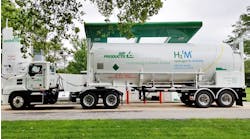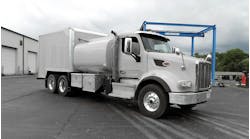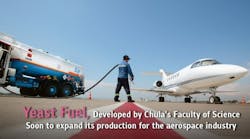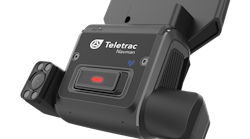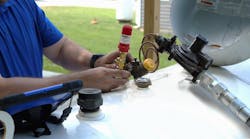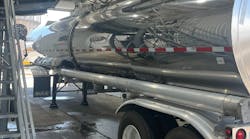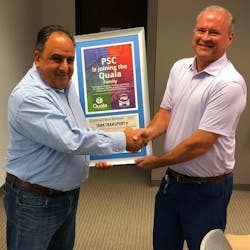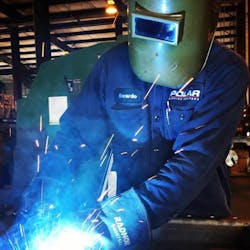Quala, North America’s largest tank wash operator, already was evolving into a provider of more comprehensive tank truck services. The company went from a handful of maintenance shops in 2018 to 22 last year.
The May acquisition of PSC accelerated its “one-stop-shop” transformation.
The largest deal in Quala’s history added 38 maintenance facilities and 300 mechanics—who are as valuable as tank truck drivers—to the company’s nationwide network, which now includes 126 locations and more than 1,500 employees; and offers tank cleaning, repair, maintenance, and inspection, along with, for the first time, tank truck parts.
“I was excited about the transaction,” said Jerry Cignarella, president of PSC and now Quala’s president of maintenance. “It just made sense. We were selling the business to people who understood the industry, so it was an easy process.”
The process of combining the two sprawling operations is ongoing. Quala president Terry O’Brien expects the company to fully migrate its legacy shops to PSC’s advanced Karmak Fusion Software by the end of the third quarter; and Edie Reaves, Quala’s chief transformation officer who’s leading the integration with PSC’s locations, technology, and branding, aims to complete the heavy lifting by the end of the year.
But the merger already is paying off for Quala and its customers, they maintained.
‘A natural fit’
Polar Service Centers started to prep for a sale by its private-equity owner, American Industrial Partners (AIP), with last year’s rebrand to PSC, Cignarella said. AIP had held PSC since acquiring it in 2015 from Questor—which had put PSC and Polar Tank Trailer under the EnTrans International banner—and many PEs seek a return on investment after five years, so Cignarella knew “it was time for an exit.” He wasn’t sure who would open the door.
A long-time industry associate ended up greeting him on the other side.
Quala executives late last year pitched the idea of combining Quala and PSC, and PSC ownership was “intrigued,” so discussions commenced around the holidays, due diligence began in earnest early this year, and a deal was agreed to in March, announced in April, and sealed in May. “It came together quickly because it was a natural fit,” Cignarella said.
Quala also is held by private equity—Advent purchased Quala from Roark Capital Group in 2016—so their strategies of aggressively pursuing growth aligned well, too, Cignarella said. PSC opened 10 locations in the last three years, and Quala added 11 via “tuck-ins” in the last 16 months, not including PSC, which “clearly is the market leader when it comes to bulk tank trailer maintenance—both in service and parts,” O’Brien said.
“That’s what made them so attractive.”
With PSC, and its 650 employees, on board, Quala went from 70 mechanics to 370, and entered previously untapped markets. “We’re really excited,” O’Brien said. “PSC has a great team, and they’re going to take our existing maintenance business to a new level.”
One-stop shop
Quala’s legacy facilities were “express shops.” They offered “light” maintenance, like brake or light replacements, and inspections, but not major repairs, or parts. With PSC, they boast a broader suite of services. “That brings a lot of value,” O’Brien said. Quala also now handles a greater variety of cargo tank equipment. “Our bread and butter was chemical and foodgrade tank trailers, whereas PSC also works on gasoline, petroleum, and pressurized gas trailers,” he said. “So it opened us up to carriers who hadn’t been our customers before.”
“There’s a supply advantage, there’s a timing advantage, there’s a cost advantage, and they’ve got distribution locations with plenty of inventory, so that’s a huge advantage for our legacy maintenance operations.” PSC’s expertise, bolstered by extensive technician training programs and career progressions, is another. A single provider that offers maintenance and cleaning across an expansive network also boosts service “velocity,” reducing turnaround times, and allowing some customers to downsize their fleets, O’Brien argued. And amenities such as Wi-Fi, safe, well-lit parking, and clean restrooms keep drivers satisfied, improving retention. “Carriers want their drivers to go somewhere they feel comfortable,” he said.
That’s why O’Brien is committed to ensuring that somewhere is Quala. Because while drivers rarely pick the wash facilities they frequent, they can—and do—let dispatchers know which ones they dislike. “There is increased sensitivity to the working conditions of bulk truck drivers, and one of those conditions includes interacting with tank cleaning and maintenance vendors.” O’Brien said. “So they’re definitely an ‘influencer.’”
Business integration
Reaves began planning the integration before the deal closed, so they could “hit the ground running.” Preparations included forming teams with representatives from both companies for each key segment of the business. “Those teams laid out detailed action plans with the timing and necessary cost impacts for the work we needed to do to combine the entities,” Reaves said. “Those were rolled up into one strategic plan, and reviewed and approved by our board and executive leadership team; and now the hard work is behind us and we’re into the execution—which is much simpler with thorough plans in place.”
A critical focus now is on assimilating their “cultures.” The companies surveyed employees in both organizations to search for “points of contention,” and identify ways to improve communications and cohesiveness. “We’re planning out some interventions and actions to help smooth those areas and bring our cultures together,” said Reaves, pointing to regular newsletters as a new channel for keeping everyone apprised.
They also scheduled a branding “workshop” for August, with key leaders gathering to discuss potential changes to Quala’s and PSC’s signage, websites, social media accounts, and more, with a third-party consultancy serving as facilitator between executives with “long-standing emotional ties and loyalties” to their respective entities, Reaves said. “The power of both these brand names is strong, so we don’t want to do anything in coming together that tarnishes or diminishes either,” she said. “We want to preserve their power.”
Reaves’ work also includes searching for areas of overlap, and making tough decisions about any duplication of locations, capabilities, or systems. “We have to consider all the benefits and drawbacks in each of these situations, and then go with the strategy that is strongest and best for the combined company,” Reaves said.
Shared technology
While Quala’s legacy shops still are migrating to PSC’s Karmak system, PSC’s six legacy tank washes already are utilizing Quala’s QualaTrax customer portal, and OnTrax real-time communications platform, which allows fleet managers to schedule cleanings in advance and track containers through the entire process. “It’s one of the most exciting things we’ve got going on with the company right now, besides the combination with PSC,” said O’Brien, adding that they’re continuing to develop and tweak this “transformational” technology
Internally, Reaves is coordinating the integration of disparate analytics, payroll, financial, and triage systems.
PSC is using Tableau for data analytics and reporting, allowing team members to track their daily performance. “It’s outstanding, so we’re adopting the same system for the Quala maintenance shops that go over,” Reaves said. Quala also is incorporating PSC’s Tank Pro inspection software, OneStream financial reporting, and its workplace triage system that accelerates the on-site treatment of any health or safety issues. “PSC was using this with fantastic results, so our EH&S team evaluated it and said it’s wonderful, and we’ve taken the whole company to the system,” she said.
Quala and PSC also were using different payroll systems, so leaders evaluated both platforms and decided to go with ADP’s company-wide, with deployment slated for the fourth quarter. “These are just a few examples where one company had something that was outstanding, and now the other one is adopting it,” Reaves said.
Customer appreciation
The ultimate goal is to compel more customers to adopt Quala by providing consistent nationwide services that appeal to larger operators with diverse tank container equipment. And leaders say early returns are encouraging.
Reaves said their research indicates long-time PSC clients want to make sure Quala doesn’t “forget about” them, and maintains the “strong customer-centric focus” for which PSC is known. No problem, she says. “Those things are important to Quala as well,” she insisted, adding that they’re hearing those messages, taking them to heart, and making sure any concerns are addressed.
“This is a relationship business,” Reaves said. “I came out of the automotive industry, and yes relationships matter everywhere. But the Ford Motor Companies and GMs of the world are massive entities. We’re much smaller, and it’s a well-connected industry, so everybody knows everybody … (and) information travels quickly.”
Fortunately, she maintains, Quala’s president keeps his finger firmly on the industry’s pulse.
The customers O'Brien has talked to view the combination as a positive, with more facilities, expanded services, and limited overlap. Their top concern is who they deal with on a local level, and little is changing in that department, he said. So they’ll continue integrating, expanding, and acquiring facilities—all in an effort to further refine an all-in-one business customers appreciate as much as Quala’s and PSC’s leaders.
For Cignarella, the message is simpler: “We’re two great companies that offer tank trailer services, and washing is a critical first step in maintenance, so it just makes sense to provide the one-stop shop our customers deserve.”
